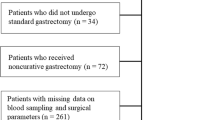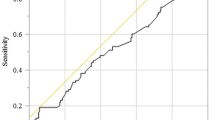Abstract
Purpose
This study investigated the prognostic value of the geriatric nutritional risk index (GNRI) in patients undergoing curative gastrectomy for remnant gastric cancer (RGC).
Methods
This multicenter retrospective study included 105 patients with RGC of ≥ 65 years of age who underwent curative gastrectomy at 10 institutions in Japan between January 2000 and December 2016. Postoperative complications, overall survival (OS), and disease-specific survival (DSS) were analyzed.
Results
Receiver operating curve analyses indicated that the optimal cutoff value of the GNRI for OS was 95.4. Patients were categorized into high and low GNRI groups based on the optimal GNRI cutoff value. The GNRI was significantly correlated with body mass index (p < 0.001), amount of bleeding (p = 0.021), Clavien–Dindo grade 5 postoperative complications (p = 0.040), death caused by primary disease (p = 0.010), and death caused by other diseases (p = 0.002). The OS and DSS were significantly worse in the low GNRI group. A low GNRI and T3 or deeper tumor invasion were independent prognostic factors for OS and DSS.
Conclusions
The GNRI is a promising predictor of both short- and long-term outcomes in older patients with RGC.



Similar content being viewed by others
Availability of data and materials
The datasets used and/or analyzed in the current study are available upon reasonable request from the corresponding author.
References
Inomata M, Shiraishi N, Adachi Y, Yasuda K, Aramaki M, Kitano S. Gastric remnant cancer compared with primary proximal gastric cancer. Hepatogastroenterol. 2003;50:587–91.
Kodera Y, Yamamura Y, Torii A, Uesaka K, Hirai T, Yasui K, et al. Incidence, diagnosis and significance of multiple gastric cancer. Br J Surg. 1995;82:1540–3.
Ohashi M, Katai H, Fukagawa T, Gotoda T, Sano T, Sasako M. Cancer of the gastric stump following distal gastrectomy for cancer. Br J Surg. 2007;94:92–5.
Yokota T, Ishiyama S, Saito T, Teshima S, Narushima Y, Murata K, et al. Lymph node metastasis as a significant prognostic factor in gastric cancer: a multiple logistic regression analysis. Scand J Gastroenterol. 2004;39:380–4.
Yamashita K, Hosoda K, Ema A, Watanabe M. Lymph node ratio as a novel and simple prognostic factor in advanced gastric cancer. Eur J Surg Oncol. 2016;42:1253–60.
Lin JX, Lin JP, Xie JW, Wang JB, Lu J, Chen QY, et al. Prognostic importance of the preoperative modified systemic inflammation score for patients with gastric cancer. Gastric Cancer. 2019;22:403–12.
(2023) Japanese Gastric Cancer Treatment Guidelines 2021 (6th edition). Gastric Cancer 26:1–25
Sekiguchi M, Oda I, Matsuda T, Saito Y. Epidemiological trends and future perspectives of gastric cancer in Eastern Asia. Digestion. 2022;103:22–8.
Takeuchi D, Koide N, Suzuki A, Ishizone S, Shimizu F, Tsuchiya T, et al. Postoperative complications in elderly patients with gastric cancer. J Surg Res. 2015;198:317–26.
Yang JY, Lee HJ, Kim TH, Huh YJ, Son YG, Park JH, et al. Short- and long-term outcomes after gastrectomy in elderly gastric cancer patients. Ann Surg Oncol. 2017;24:469–77.
Saito H, Kono Y, Murakami Y, Shishido Y, Kuroda H, Matsunaga T, et al. Prognostic significance of the preoperative ratio of C-reactive protein to albumin and neutrophil-lymphocyte ratio in gastric cancer patients. World J Surg. 2018;42:1819–25.
Murakami Y, Saito H, Kono Y, Shishido Y, Kuroda H, Matsunaga T, et al. Combined analysis of the preoperative and postoperative prognostic nutritional index offers a precise predictor of the prognosis of patients with gastric cancer. Surg Today. 2018;48:395–403.
Miyatani K, Sakano Y, Makinoya M, Miyauchi W, Shimizu S, Shishido Y, et al. A low cumulative perioperative prognostic nutritional index predicts poor long-term outcomes in patients with gastric cancer: a single-center retrospective study in Japan. Surg Today. 2023;53:1294–304.
Bouillanne O, Morineau G, Dupont C, Coulombel I, Vincent JP, Nicolis I, et al. Geriatric nutritional risk index: a new index for evaluating at-risk elderly medical patients. Am J Clin Nutr. 2005;82:777–83.
Matsunaga T, Saito H, Osaki T, Takahashi S, Iwamoto A, Fukuda K, et al. Impact of geriatric nutritional risk index on outcomes after gastrectomy in elderly patients with gastric cancer: a retrospective multicenter study in Japan. BMC Cancer. 2022;22:540.
Dindo D, Demartines N, Clavien PA. Classification of surgical complications: a new proposal with evaluation in a cohort of 6336 patients and results of a survey. Ann Surg. 2004;240:205–13.
(2011) Japanese gastric cancer treatment guidelines 2010 (ver. 3). Gastric Cancer 14:113–23
(2017) Japanese gastric cancer treatment guidelines 2014 (ver. 4). Gastric Cancer 20:1–19
Lidoriki I, Schizas D, Frountzas M, Machairas N, Prodromidou A, Kapelouzou A, et al. GNRI as a prognostic factor for outcomes in cancer patients: a systematic review of the literature. Nutr Cancer. 2021;73:391–403.
Hayama T, Hashiguchi Y, Ozawa T, Watanabe M, Fukushima Y, Shimada R, et al. The preoperative geriatric nutritional risk index (GNRI) is an independent prognostic factor in elderly patients underwent curative resection for colorectal cancer. Sci Rep. 2022;12:3682.
He L, Li Y, Qu L, Zhang F. Prognostic and clinicopathological value of the geriatric nutritional risk index in gastric cancer: a meta-analysis of 5,834 patients. Front Surg. 2022;9:1087298.
Gupta D, Lis CG. Pretreatment serum albumin as a predictor of cancer survival: a systematic review of the epidemiological literature. Nutr J. 2010;9:69.
Rodríguez SFMJ, Aguilar Martínez A, Manuel-y-Keenoy B. Influence of body weight on the prognosis of breast cancer survivors; nutritional approach after diagnosis. Nutr Hosp. 2013;28:1829–41.
Lu L, Ji S, Jiang J, Yan Y. Body weight is a valid predictor of the long-term prognosis of cervical cancer. Comput Math Methods Med. 2022;2022:5613350.
Chai FY, Jiffre D. Preoperative hypoalbuminemia is an independent risk factor for the development of surgical site infection following gastrointestinal surgery. Ann Surg. 2011;254:665.
Oñate-Ocaña LF, Aiello-Crocifoglio V, Gallardo-Rincón D, Herrera-Goepfert R, Brom-Valladares R, Carrillo JF, et al. Serum albumin as a significant prognostic factor for patients with gastric carcinoma. Ann Surg Oncol. 2007;14:381–9.
Kuroda D, Sawayama H, Kurashige J, Iwatsuki M, Eto T, Tokunaga R, et al. Controlling Nutritional Status (CONUT) score is a prognostic marker for gastric cancer patients after curative resection. Gastric Cancer. 2018;21:204–12.
Matsui R, Inaki N, Tsuji T. Impact of malnutrition as defined by the global leadership initiative on malnutrition criteria on the long-term prognosis in older patients with gastric cancer after gastrectomy. Surg Today. 2023;53:578–87.
Cai W, Yang H, Zheng J, Huang J, Ji W, Lu Y, et al. Global leaders malnutrition initiative-defined malnutrition affects long-term survival of different subgroups of patients with gastric cancer: a propensity score-matched analysis. Front Nutr. 2022;9:995295.
Deng JY, Liang H. Clinical significance of lymph node metastasis in gastric cancer. World J Gastroenterol. 2014;20:3967–75.
Li F, Zhang R, Liang H, Liu H, Quan J, Zhao J. The pattern of lymph node metastasis and the suitability of 7th UICC N stage in predicting prognosis of remnant gastric cancer. J Cancer Res Clin Oncol. 2012;138:111–7.
Yang B, Liu T, Cui H, Lu Z, Fang G, Xue X, et al. The value of lymph nodes ratios in the prognosis of resectable remnant gastric cancer through the retrospective propensity score matching analysis. World J Surg Oncol. 2023;21:245.
Iwasaki K, Barroga E, Shimoda Y, Enomoto M, Yamada E, Miyoshi K, et al. Clinicopathological features of remnant gastric cancer after gastrectomy. Am Surg. 2023;89:1381–6.
Matsuo K, Lee SW, Tanaka R, Imai Y, Honda K, Taniguchi K, et al. T stage and venous invasion are crucial prognostic factors for long-term survival of patients with remnant gastric cancer: a cohort study. World J Surg Oncol. 2021;19:291.
Hanada M, Yamauchi K, Miyazaki S, Hirasawa J, Oyama Y, Yanagita Y, et al. Geriatric Nutritional Risk Index, a predictive assessment tool, for postoperative complications after abdominal surgery: a prospective multicenter cohort study. Geriatr Gerontol Int. 2019;19:924–9.
Xie H, Tang S, Wei L, Gan J. Geriatric nutritional risk index as a predictor of complications and long-term outcomes in patients with gastrointestinal malignancy: a systematic review and meta-analysis. Cancer Cell Int. 2020;20:530.
Schwegler I, von Holzen A, Gutzwiller JP, Schlumpf R, Mühlebach S, Stanga Z. Nutritional risk is a clinical predictor of postoperative mortality and morbidity in surgery for colorectal cancer. Br J Surg. 2010;97:92–7.
Fukuda Y, Yamamoto K, Hirao M, Nishikawa K, Maeda S, Haraguchi N, et al. Prevalence of malnutrition among gastric cancer patients undergoing gastrectomy and optimal preoperative nutritional support for preventing surgical site infections. Ann Surg Oncol. 2015;22:S778–85.
Acknowledgements
We thank Enago Group for editing a draft of this manuscript.
Author information
Authors and Affiliations
Corresponding author
Ethics declarations
Conflict of interest
The authors state that they do not have any competing interests.
Ethics approval and consent to participate
All procedures were performed following the ethical standards of the responsible committee on human experimentation (institutional and national) as well as the 1964 Declaration of Helsinki and subsequent revisions. The study protocol was approved by the institutional review boards of each participating hospital [Tottori University Hospital ethics committee (19A133); Japanese Red Cross Tottori Hospital ethics committee (82-3); Tottori Prefectural Central Hospital ethics committee (2020-1); Sanin Rosai Hospital ethics committee (2020-13); Matsue City Hospital ethics committee (2A-0005); Hamada Medical Center ethics committee (3072); Yonago Medical Center ethics committee (0204-02); ethics committee of Tottori Prefectural Kousei Hospital (207); Masuda Red Cross Hospital Medical Ethics Committee (75); Saihaku Hospital ethics committee (20072)]. In this retrospective study, the patients were not required to provide informed consent because the analyses relied on anonymous clinical data obtained after each patient agreed to treatment in writing. We also used an opt-out method on the website to obtain consent for this study, which was approved by the institutional review board.
Consent for publication
Not applicable.
Additional information
Publisher's Note
Springer Nature remains neutral with regard to jurisdictional claims in published maps and institutional affiliations.
Supplementary Information
Below is the link to the electronic supplementary material.
Rights and permissions
Springer Nature or its licensor (e.g. a society or other partner) holds exclusive rights to this article under a publishing agreement with the author(s) or other rightsholder(s); author self-archiving of the accepted manuscript version of this article is solely governed by the terms of such publishing agreement and applicable law.
About this article
Cite this article
Matsunaga, T., Saito, H., Osaki, T. et al. Using the geriatric nutritional risk index to predict outcomes in older patients with remnant gastric cancer after gastrectomy: a retrospective multicenter study in Japan. Surg Today (2024). https://doi.org/10.1007/s00595-024-02850-w
Received:
Accepted:
Published:
DOI: https://doi.org/10.1007/s00595-024-02850-w




